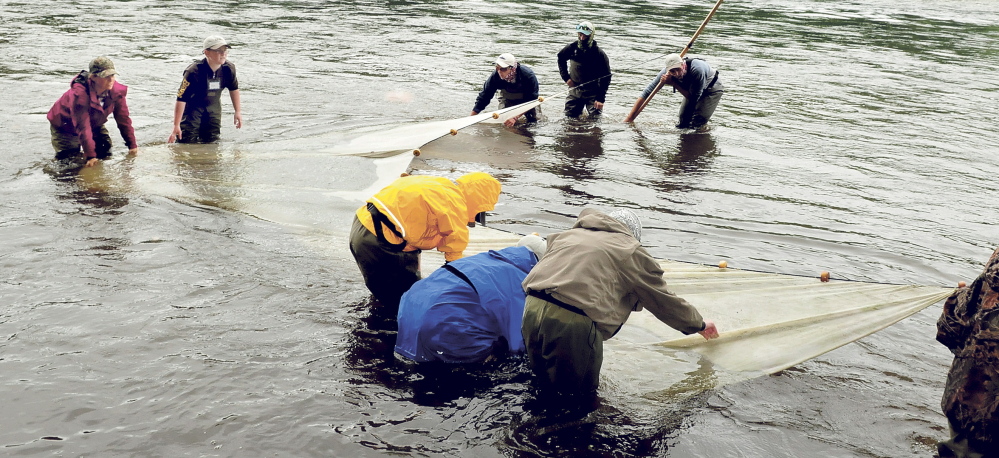SOLON — On the banks of the Kennebec River, a dozen teenagers laid out a 25-foot-long net and tied it to two poles. They waded into the water, some of them dragging the net while others walked through the brush in hopes of scaring fish out of the tall grass.
It was a rainy morning on the Kennebec, and although high and fast-moving water prevented the fish from staying in one place, it didn’t stop the 12 teenagers from looking for them.
“I like the whole outdoors part of it,” said 12-year-old Noah Cummings of Sidney, the youngest of the bunch.
Thursday was the second-to-last day of the Maine Trout Unlimited Trout Camp, a week of waking up at 5 a.m. to fish, learning to tie flies and cast, and studying the ecosystem and biology of the Kennebec River, home to trout, salmon, splake and other fish species.
CONSERVING FISHERIES
The camp is sponsored by Trout Unlimited, a national organization that works to conserve coldwater fisheries. The camp has been held at Evergreens Campground in Solon for the last 10 years.
The Kennebec, which was once among the most renowned brown trout fishing sites in the U.S., has seen catch rates drop in the last decade. Biologists are trying to understand and explain the changes.
For the last week, the river has held the attention of the 12 teenagers, ranging in age from 12 to 17. They came from Maine and from far away, as teens from California, Pennsylvania and Rhode Island were among those making their way to the out-of-the-way campground.
Understanding changes to fish habitat and the tools biologists use to understand them and study the fish was as much a part of the camp on Thursday as actual fly-fishing techniques. The focus has been on methods biologists use to catch fish. About 30 volunteers, many of them local fly fishermen, have been in and out of the camp this week, and many of them gathered on the mosquito-infested banks of the river with their cameras Thursday.
WADING IN, LITERALLY
“There’s so much knowledge here, we could be here for 30 years and couldn’t learn everything,” said 16-year-old Johnny Miller of Milford, Pennsylvania.
At around 10 a.m. – after some of the teens had already been awake for hours to get in some fishing, eat breakfast and talk with a local biologist about the state of the fishery – they put on their waders and went down to the banks, where they were instructed by Steve Coghlan, a professor of freshwater fisheries ecology at the University of Maine, on seine fishing, a method of capturing fish using a large net. Often used by bait fishermen and sometimes by biologists, seining requires a special permit, although biologists are allowed to demonstrate the method for education purposes.
Steady rain had fallen overnight, making the water bad for fishing, according to the camp leaders, who said that fast water also tends to mean the fish are moving fast and not staying in one place, making it harder to catch them.
THINKING ABOUT SUSTAINABILITY
Nonetheless, the students waded into the water under the instruction of Coghlan, who had them trudge upstream with the giant net, hoping to scoop up trout or salmon. Their first attempt landed them a piece of driftwood, and other attempts were also unsuccessful, resulting in nothing more than some insects and a few minnows.
The idea is to keep the net close to the shore so that walking will scare fish out of the grass, but Coghlan said the demonstration was intended more to teach the students about the technique than to actually catch fish. Seining is a technique that usually works best on lakes and ponds or slow-moving water, he said.
And more so, it was to get students thinking about sustainability and the human impact on ecology.
. “Many popular fisheries, not necessarily this one, but many, are collapsing because they are harvested unsustainably,” said Coghlan.
“That’s something that you guys coming into this world are going to have to deal with. It’s up to you to think sustainably, to think are we living sustainably and can we sustain ourselves.”
Rachel Ohm can be contacted at 612-2368 or at:
rohm@centralmaine.com
Send questions/comments to the editors.





